If you plan to leave your mobile home vacant with the heat off, you will need to winterize your mobile home. Winterizing the mobile home will keep the water pipes, toilets, and sinks from breaking during cold temperatures. Hopefully, this article How to Winterize a Mobile Home will help you through the process.
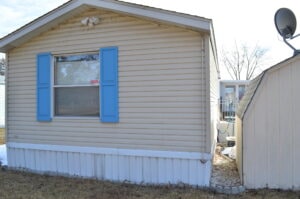
How to Winterize a Mobile Home
You are probably already aware that water starts to freeze at approximately 32 degrees Fahrenheit. However, it must be a bit colder for your mobile home pipes to start to freeze. 20 degrees Fahrenheit is the typical temperature for mobile home pipes to start to freeze.
There are many things that come into play when trying to figure out just when the pipes will freeze. Is the underpinning or skirting on your mobile home secure? Is it windy outside? Has it been cold for days? All these things can cause your mobile home to freeze up quicker.
For more information read our article on Frozen Pipes Mobile Home
How Much Does It Cost to Winterize a Mobile Home
Hiring someone to winterize your mobile home is a great idea if you are unsure of how the process works. Just be sure to find someone who has references and can do the job correctly. Improperly winterizing a mobile home can cost you hundreds of dollars in damage.
The cost of winterizing a mobile home really depends on a variety of instances such as the location of the mobile home, the age of the home and how difficult a job it may be.
Winterizing a mobile home typically runs around $150 – $300, on average.
How to Winterize a Mobile Home: Trailer Home
To start the winterization process you first want to locate the main mobile home water shutoff valve. This valve is located under the mobile home. You will have to pull back the mobile home underpinning and locate it.
For more information read our article on Underpinning Mobile Home.
This valve is typically located in the middle part or towards the back of the trailer home. Take a piece of cardboard to lay on and you can easily slide under the trailer a few feet to turn this valve off.
TIP: If you live in a mobile home park and the valve will not turn you may have to contact the mobile home park maintenance person to turn off the main supply from the park.
How to Drain a Mobile Home Hot Water Heater
After shutting off the water supply you will need to hook a garden hose to the bottom of the hot water heater. The hot water heater is typically located in a master bedroom closet in the mobile home.
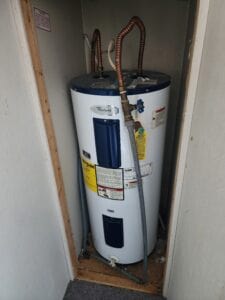
Once you have the garden hose hooked to the hot water heater, run the hose outside. Make sure the garden hose is sloped downward outside and away from the mobile home. This will help to drain the water out. There is a lot of water in a hot water heater, and you do not want it draining near your home.
Next, slowly turn the valve on the hot water heater. The water should start to drain from the unit. This process can take approximately one hour depending on how much water is in the hot water heater.
How to Winterize a Mobile Home: Singlewide & Doublewide
Next, turn on all the faucets outside and inside. Be sure to flush the toilets this will move any access water out of the trailer.
Now take a small air compressor and head to the laundry area.
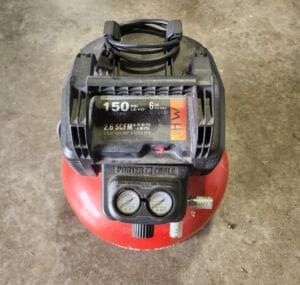
There will be a hot and cold-water supply line that comes into the washing machine. Remove these supply lines from the wall. You will need a small garden hose line to hook onto the laundry cold water fitting and hook the other end to your air compressor. Having a line like pictured below will help.
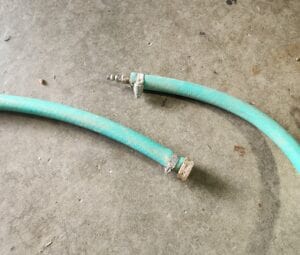
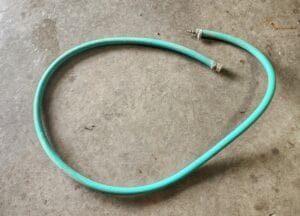
How to Winterize a Mobile Home
Once you have the fitting hooked on to the air compressor turn the air compressor on. This will blow out the remaining water from the mobile home water lines. You should see water start to flow out of the faucets.
After you have let the air run through the line for five minutes then hook onto the laundry hot water line and turn the air compressor on again. This way you blow out both the cold and hot water lines to the home.
Once the water is clear from the lines you will need to dump R.V. anti-freeze down the sink traps in the kitchen and bathrooms.
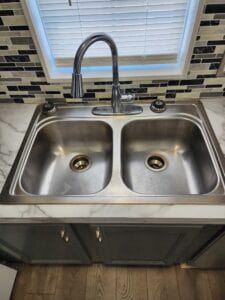
You will need approximately two gallons of R.V. anti-freeze for a singlewide mobile home and doublewide mobile home. If you have a three-bathroom home, you could use another gallon just to be safe.
You also need to place R.V. antifreeze in the trap to the shower or bathtubs as well. This will prevent any excess water from freezing and busting the lines.
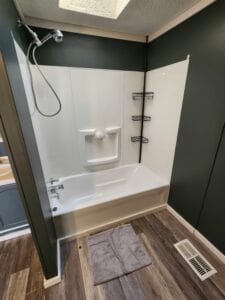
How to Winterize a Mobile Home Toilet
Now that you have most of the water out of the lines and have taken care of the sinks, tubs, and showers it is now time to winterize the toilets. First, flush the toilets if you haven’t already. This will remove any access water from the lines.
The easiest way to winterize a mobile home toilet is to use a small shop vacuum. Take the vacuum and suck the remaining water out of the tank of the toilet and out of the seat of the toilet.
Water pools in these two areas even after being flushed and you do not want to leave water in a toilet. Water that freezes in a toilet will bust the porcelain and this can be expensive to fix.
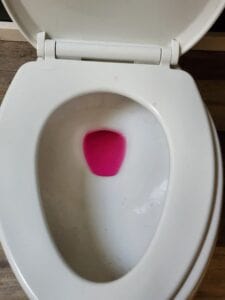
Once you have removed all the water from each toilet place R.V. antifreeze in the tank and in the seat area of the toilet. About 2 to 3 inches of R.V. antifreeze will do the trick.
Important Mobile Home Winterizing Tips
Once you have the whole home winterized be sure to shut off the power at the breaker. If you leave the power on you will damage the hot water heater. A hot water heater that is empty will continue to try to heat. This will burn out the element on the hot water heater and it will need to be replaced if you do not shut off the power.
Be sure to dump some R.V. antifreeze into the bottom of the dishwasher if your mobile home has one. This can help to keep your dishwasher safe from freezing.
Be sure to turn off the HVAC system now as well. You will no longer need to heat the mobile home during the cold months.
It is a good idea to flip off the main power to the mobile home inside at the breaker box as well as the main supply outside. Leaving power hooked up to a home that is vacant could cause issues.
Be sure to use R.V. antifreeze for winterizing your mobile home. It is typically pink in color and can be purchased at any of the local hardware or automotive stores. The antifreeze typically runs $3 to $4 per gallon jug.
How to Winterize a Mobile Home That is Vacant
Trying to winterize a mobile home that is vacant can be more of a challenge. If there is no power to the mobile home, you will need to bring a portable generator to complete the job.
Blowing out the water lines on the mobile home is very important. You will need power to run your air compressor. Blowing out the water lines keeps the lines underneath the home from busting during cold temperatures.
Once you have located a portable generator just follow the steps above to complete the process.
How to Winterize a Park Model Home
When it comes to winterizing a park model mobile home it should be no different than winterizing a regular mobile home. Simply follow the steps of draining the hot water heater, blowing out the water lines, draining the toilets and dumping R.V. antifreeze into each as described above. Park models are simply smaller mobile homes after all.
Mobile Home Winterization Checklist
When it comes to wintering a mobile home the easiest way to do it is to have a checklist handy. There is a lot to remember when it comes to winterizing a mobile home. Just missing one step to the process can cause major damage to your mobile home. Here is a printable list that you can use.
How to De-Winterize a Mobile Home
To de-winterize a mobile home there are some steps you should follow.
First make sure the valve to the hot water heater is closed. When you winterize a home, you typically open this valve, so it is important to make sure it is closed if you plan to turn the water back on to your mobile home. Not placing this valve in the shut position will cause water to go spraying all over, so be sure to check this first.
Turn on all the faucets in the home inside and outside. This will help to get rid of any air pressure in the lines before you turn the main water line on.
Next, you will need to turn on the main water supply to the mobile home. Locate the water shutoff valve and turn it on. If you have a mobile home in a park and they shut off the main valve to their supply, you will want to contact them to turn it back on.
Now that the faucets are on, and the main water supply is open you should hear the faucets start to run. The faucets will jug loudly, and spray water so be aware that this is normal. This will help to clear out any antifreeze that is left from the home being winterized.
Check out each toilet in the home. Inspect the back of each toilet to make sure there are no cracks around the base or the tank area. Behind the toilet there should be a water supply line. Make sure the water is on and gently flush the toilet. This will bring the water back into the toilet tank and seat area.
Test the washing machine and dishwasher to make sure they run properly. Inspect the systems to make sure there is no damage.
How to Winterize a Mobile Home: Conclusion
In conclusion, it doesn’t matter if you hire someone to winterize your mobile home or if you do the job yourself. Now you have a basic idea of how to do the job properly. Doing the job thoroughly and correctly is important when it comes to winterizing your mobile home. Hopefully this article How to Winterize A Mobile Home has helped.
Leaving your mobile home without heat can cause your drywall to crack inside. Read our article on Why is My Ceiling Cracking?
Are you looking to sell your mobile home and you still owe on it. Read our article Sell My Mobile Home with a Mortgage.
FAQ’s: How to Winterize a Mobile Home
How do I prepare my mobile home for winter?
Remember that safety is a top priority when preparing for winter. It’s essential to take these precautions to keep your mobile home warm, energy-efficient, and safe during the cold months. Doing things like weatherproofing, skirting and underbelly insulation, furnace maintenance and fireplace and chimney safety will help to get your home ready.
How do I keep my pipes from freezing under my mobile home?
To prevent pipes from freezing in your mobile home, insulate them, use heat tape or cable, and keep a slow, steady drip of water running from faucets during very cold weather. Additionally, make sure your mobile home is well-insulated and skirting is in good condition to retain heat and protect pipes.
How do you winterize a mobile home with antifreeze?
To winterize a mobile home with antifreeze, follow these steps: Drain the water lines and tanks, and then add RV antifreeze to the plumbing system to prevent freezing. Make sure all faucets and fixtures have antifreeze flowing through them, including toilets, to protect against cold temperatures.
